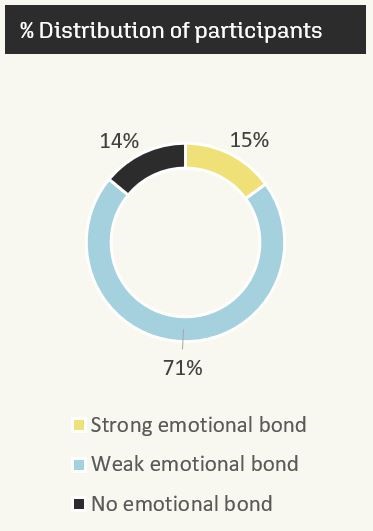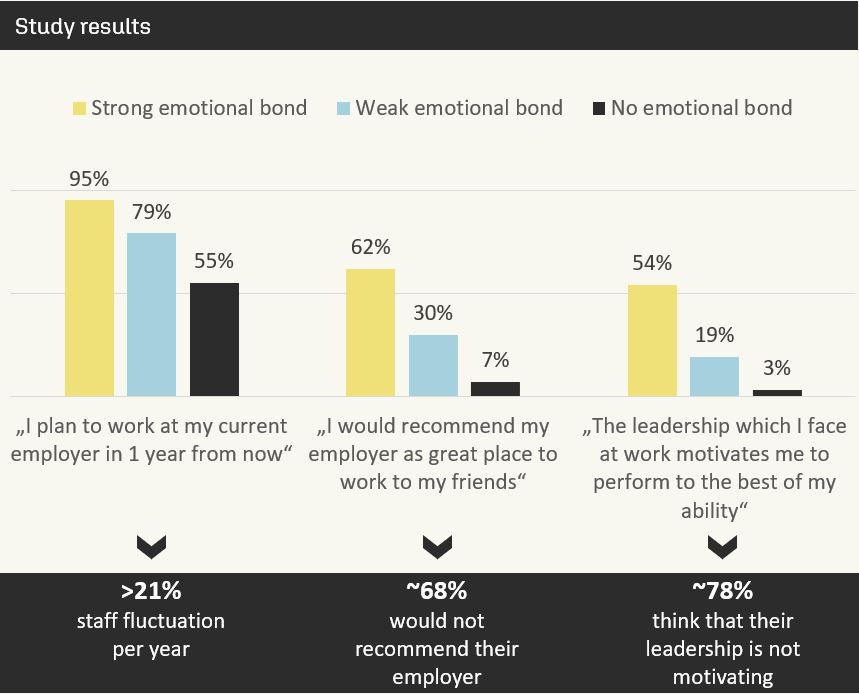2020-07-15
Employee retention in Germany – Study results from Gallup’s Engagement Index 2018
The War for Talents is an enormous challenge for German companies since several years. The needs of employees are constantly increasing and challenge companies to create a working environment that meets their demands. Thereby, a fair salary and playfully designed kitchens are no longer sufficient. Rather, other factors such as the feeling of togetherness and appreciation at the workplace play a more and more important role. Therefore, it is important to create a work environment that strengthens the emotional bond between employee and employer.
Gallup has analysed employee retention in Germany. In the following, the results of the study are presented.
For the study, employee retention was analysed along 4 categories (growth, teamwork, support, basic needs) and 12 questions (the so-called Gallup Q12). As a result, the participants of the study could be divided into 3 groups based.
The study shows that 15% of the respondents belong to group 1, 71% to group 2 and 14% to group 3. Hence, 85% have only little or no emotional ties to their employer. This becomes particularly relevant when interpreting the study results, as the results of these groups differ greatly from those of employees with strong emotional ties.

Source: Gallup Engagement Index 2018
Statement #1: "I intend to still be employed by my current company one year from now"
This question was affirmed by 95% of employees with strong emotional ties. Among employees with little or no emotional attachment to the company, the figures were only 79% and 55% respectively. This already clearly shows how employees with low emotional attachment feel about the employment relationship. For companies, these figures represent a weighted average employee turnover of >21% per year.
Statement #2: "I would recommend my company as a great place to work to my friends & family"
This question also highlights the difference between employees with strong emotional ties and employees with little or no emotional ties. While 62% of employees with strong emotional ties affirmed this question, employees with little (30%) or no (7%) emotional ties showed a much more negative perspective on recommending the current employer. Especially in times of the War for Talents, the recommendation of further talents through the network of employees is an efficient way for companies to find new employees. Accordingly, a low emotional bond between employees and the company leads to an enormous disadvantage in using referrals as acquisition channel.
Statement #3: "The leadership I experience at work motivates me to do excellent work".
This question was not answered very positively across all participant groups. Although only 54% of the employees with strong emotional ties affirmed this question, the enormous difference to employees with little (19%) or no (3%) commitment is also evident here. The low level of motivation can have a negative effect on the work performance of employees. Accordingly, companies should test new and innovative ways to increase employee motivation.
Tips and tricks on how to motivate your employees can be found in our article
<<< Work Motivation – Tips & Tricks for CEOs, managers, and team leads >>>
 Source: Gallup Engagement Index 2018
Source: Gallup Engagement Index 2018
Employees who have already resigned internally and lost the bond to the company not only lack motivation to do the actual work but also have a negative influence on the team spirit. Gallup estimates the economic costs due to internal redundancies in Germany in 2018 at ~100Mrd €.
If an employee does resign from the job, the company usually loses expertise, knowledge and contacts - things that are difficult to transfer 1 to 1 to the new employee. In addition, the search for and selection of an adequate replacement usually involves high expenditure of resources such as working time and capital. According to Gallup, companies must spend on average 1.5 times the annual salary of an employee to replace him or her equivalently on average.
Even after a suitable replacement has been found and has started to work, the low level of commitment of the former employee shows signs of aftermath. The reason for this is the long time (sometimes several months) it takes until new employees can work productively in their new role.
From the company's point of view, it seems to be essential to actively put this topic on top of the business’s agenda. The right kind of employee appreciation can be a lever to bind employees more strongly to their own company.
More information about Gallup’s Engagement Index 2018 can be found here
Gallup has analysed employee retention in Germany. In the following, the results of the study are presented.
Scope of the study
For the “Engagement Index 2018” study, Gallup surveyed 1,000 employees in Germany. Thereby, the company focused to ensure that the participants were selected to represent the entire workforce in Germany.For the study, employee retention was analysed along 4 categories (growth, teamwork, support, basic needs) and 12 questions (the so-called Gallup Q12). As a result, the participants of the study could be divided into 3 groups based.
- Group 1: Employees with strong emotional ties to the company
- Group 2: Employees with weak emotional ties to the company
- Group 3: Employees with no emotional ties to the company
The study shows that 15% of the respondents belong to group 1, 71% to group 2 and 14% to group 3. Hence, 85% have only little or no emotional ties to their employer. This becomes particularly relevant when interpreting the study results, as the results of these groups differ greatly from those of employees with strong emotional ties.

Source: Gallup Engagement Index 2018
Study results
In the course of the study, the participants were confronted with targeted statements in order to derive the effects of different levels of emotional ties to companies. Subsequently, the answers were analysed and compared along the 3 groups of participants described above. In the following, selected statements as well as the corresponding results are presented as examples.Statement #1: "I intend to still be employed by my current company one year from now"
This question was affirmed by 95% of employees with strong emotional ties. Among employees with little or no emotional attachment to the company, the figures were only 79% and 55% respectively. This already clearly shows how employees with low emotional attachment feel about the employment relationship. For companies, these figures represent a weighted average employee turnover of >21% per year.
Statement #2: "I would recommend my company as a great place to work to my friends & family"
This question also highlights the difference between employees with strong emotional ties and employees with little or no emotional ties. While 62% of employees with strong emotional ties affirmed this question, employees with little (30%) or no (7%) emotional ties showed a much more negative perspective on recommending the current employer. Especially in times of the War for Talents, the recommendation of further talents through the network of employees is an efficient way for companies to find new employees. Accordingly, a low emotional bond between employees and the company leads to an enormous disadvantage in using referrals as acquisition channel.
Statement #3: "The leadership I experience at work motivates me to do excellent work".
This question was not answered very positively across all participant groups. Although only 54% of the employees with strong emotional ties affirmed this question, the enormous difference to employees with little (19%) or no (3%) commitment is also evident here. The low level of motivation can have a negative effect on the work performance of employees. Accordingly, companies should test new and innovative ways to increase employee motivation.
Tips and tricks on how to motivate your employees can be found in our article
<<< Work Motivation – Tips & Tricks for CEOs, managers, and team leads >>>
 Source: Gallup Engagement Index 2018
Source: Gallup Engagement Index 2018Little to no emotional ties is a problem for companies
The effects of lacking emotional ties between employees and companies are manifold and touch various stages in the process cycle of replacing unmotivated employees.Employees who have already resigned internally and lost the bond to the company not only lack motivation to do the actual work but also have a negative influence on the team spirit. Gallup estimates the economic costs due to internal redundancies in Germany in 2018 at ~100Mrd €.
If an employee does resign from the job, the company usually loses expertise, knowledge and contacts - things that are difficult to transfer 1 to 1 to the new employee. In addition, the search for and selection of an adequate replacement usually involves high expenditure of resources such as working time and capital. According to Gallup, companies must spend on average 1.5 times the annual salary of an employee to replace him or her equivalently on average.
Even after a suitable replacement has been found and has started to work, the low level of commitment of the former employee shows signs of aftermath. The reason for this is the long time (sometimes several months) it takes until new employees can work productively in their new role.
Employee appreciation as one factor to increase employee loyalty
The right kind of employee appreciation is only one way to increase the emotional attachment of employees to companies. Among other things, appreciation from employee to employee (instead of from superior to employee) can help to relieve superiors in the process of employee motivation. In addition, the appreciation of a colleague strengthens the feeling of togetherness in the team and promotes the emotional bond with the company environment.Conclusion
Gallup's study "Engagement Index 2018" shows the effects that emotional ties between employees and companies can have. As a result, increasing the bond with employees improves the company's position in the War for Talents and saves money in the area of talent acquisition.From the company's point of view, it seems to be essential to actively put this topic on top of the business’s agenda. The right kind of employee appreciation can be a lever to bind employees more strongly to their own company.
More information about Gallup’s Engagement Index 2018 can be found here
